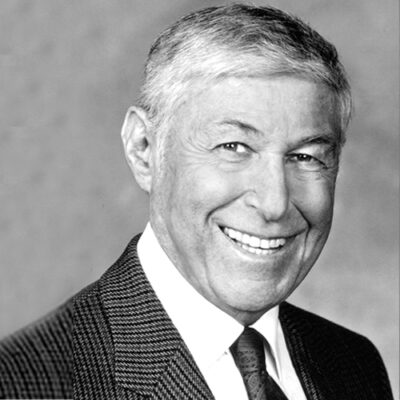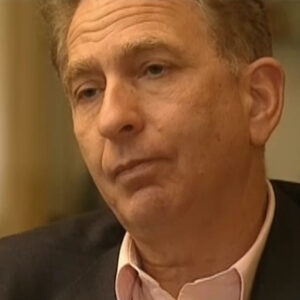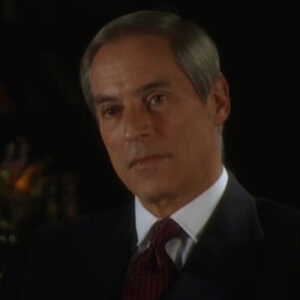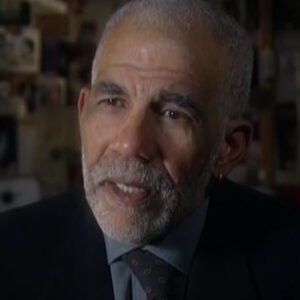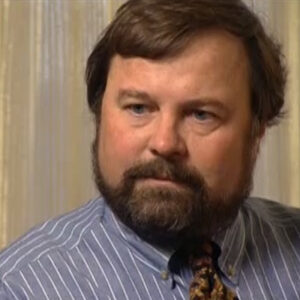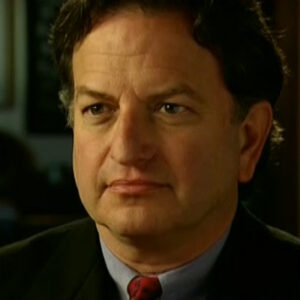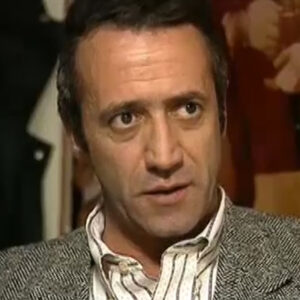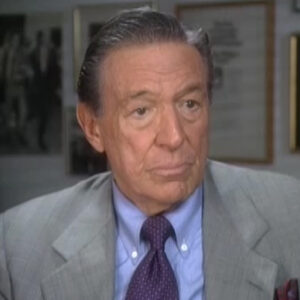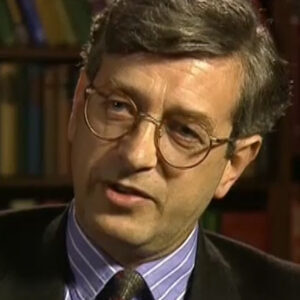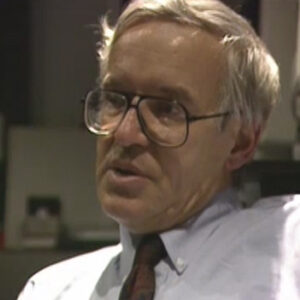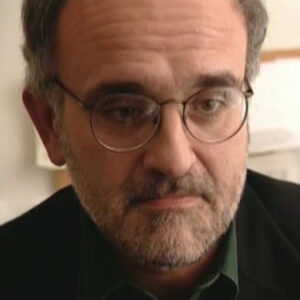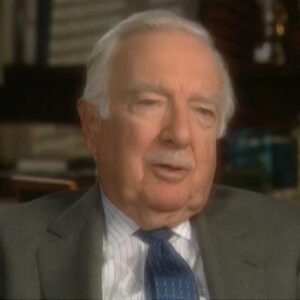Speaker How in the early days, because I’m sure by now you’ve learned your way around how the early days did you go about trying to get your own way done?
Speaker What is the Morley Safer method is that you had effectively had pretty unsubtle screening, often brings out my and Don’s worst personality defects. I get really sarcastic sometimes with him. He just gets. Crazy, angry shouting, as I say, those confrontations. So actually, what’s often more amusing than seeing us in action at full tilt in that respect is seeing both of us trying to be polite to each other, which is to really be hilarious. I spent an awful lot of time looking over my shoulder, as you can tell, but myself, and and it’s almost like some. 17TH century golf was, you know, a dance with sort of rules that we all go through, then it ends up needing to screening. But we do try. I suppose the net effect of that kind of. That’s what people might use as a cliche, Michelle used to, you know, it’s kind of creative tension. That’s good. I’m not so sure. I’m not so sure about that.
Speaker But I think in the in the final analysis, it makes for a good broadcast TV about ramshackled. Oh, I used ramshackle is now. I decided I was going to create it. Nowhere is it writ that you can’t quite make up words. How do you think words got here if people didn’t make them up?
Speaker And I described the house as a ramshackle, which I think is pretty descriptive.
Speaker And Don.
Speaker Didn’t think so. I don’t know what the in the end would have got away with or not. Oh, there was another word I thought I invented a word which I hadn’t and that he took objection to it. I won that one. And I described it was an old steamship, very low that I described as chuntering along. That was good work. But it’s on a better path in a certain way. And I thought pretty interesting word, Don. Answer there’s no such word. Went to every conceivable dictionary not to prove his point. And wouldn’t you know, within three months I saw the word three times in three different books, all in the same context. Actually, my wife spotted two of them. She reads a lot of mysteries and in two different mysteries. The word was once wants to describe train and he wants to describe vote. Maybe he wants to describe a car. So and then we found it. We actually found it in the fall. Oh, we get, you know, the big whatever volume Oxford English Dictionary that was meaning more or less what I did.
Speaker You bring it to Don and say, see these fellows.
Speaker But he still doesn’t believe me.
Speaker So how important is the word? Everything, that word, a single word. I mean, you can you could spend. Well, the word a word.
Speaker Well, I think this is something you probably both agree on. Don does something I’ve always thought very, very important in television. In other words, what you say or what anybody says is what really it is all about.
Speaker I don’t care how wonderful the pictures are and how talented the cameramen are in capturing the mood, the light, the dullness, the drabness, the tragedy, the sparkle, whatever, unless you are conveying the ideas that you want to look into. And I think both easy to understand words and with a certain kind of elegance, I think it becomes what what one does becomes very commonplace.
Speaker Let’s see, how long can you fight over a word?
Speaker Forever series that really.
Speaker I want to use an example, says Ramshackled, for example, he says that was a clip not that’s not a good one to give me a good example so I can use it as a clip, too.
Speaker Can you think?
Speaker I can’t recall why my dad should write these things. I might end up using ramshackled OK. I understand that you’re quite the gambler.
Speaker I was I haven’t been for a long, long time. Was that how the poker games came about?
Speaker Oh, well, there you have it. The public and the poker games were just me and Don and Phil Scheffler. Mike would occasionally play.
Speaker These terrible poker player, a terrible poker player, dance good poker player. Interesting, I mean, to the extent that all of the phrase poker face, Don, has good poker face.
Speaker So we haven’t done that for years, we used to do it. I mean, for the three of us, we will use maybe once or twice a week even to make a good player like make no marks on a good player. Mike, Mike has is too. He’s too cheap to too mean about money and to restless, I think, to concentrate on a poker game. So who is the big winner? It’s probably fairly, even evenly divided among the three of us tonight as well. Gunton, maybe ahead of the pack.
Speaker I wanted to show you something here, but I’m fortunate I don’t have a VCR here. But Chuck Madelin, one of Dan’s brilliant ideas.
Speaker Well, it was this clip where he takes off his shirt. Oh, Medlen does. Yes. I can’t remember why.
Speaker Why do you want to show you all these cigarette burns? The scars are what a tough guy he was.
Speaker And how did that tells the story of Chuck? Man, I’m going to ask Don to tell it. Also, I’m also going to ask Chuck what?
Speaker WERSHBA No more. Wershba probably remembers more than the rest of us because Wershba, which is a good reporter, and he probably wrote everything down or has a pretty good memory of it.
Speaker But what’s your memory of this is? My memory goes I mean, one terrible mistake that I was I worked late.
Speaker Joe made an equally terrible mistake. He worked late. In fact, we were working together on something. And Don came in as irrepressible, Don, and said, that’s great, this guy is coming. And it was a no one knows what happened to Jimmy Hoffa. We’re both a little bit skeptical.
Speaker Don was not without skepticism, but by God, he saw that headline, Hoffa’s body found, Jimmy Hoffa found. And this guy came. And it was a weird character in the company of another weird character. And how they teamed up, I don’t know. And Medlen claimed to be an ex-con, which indeed he was.
Speaker And the other fellow was a seriously troubled born again man who spoke in tongues by the end of this affair. We were all speaking in tongues, I’ll tell you. And he wanted money. And we are not in the business of paying for stories.
Speaker But Don just became so overheated about this and he talked Dixieland into giving Medlen and his partner was a ten thousand dollars. And then Midland’s after he got the money or the promise of the money, sat down and did this absurd interview. Not my finest hour, but I’m listen, I’m a slave. I’ll do it.
Speaker But says that’s my excuse. And of course, the plan was he would then don’t out of that, he would take us down to Florida and we would meet Key West and he would show us where Jimmy Hoffa was. And you believe him was had become, you know, food for the fishes and of we are done in Florida and Mr. Medlin and the other fella never showed.
Speaker I think they will split the money. Medlen got it off. But there were some really amusing postscript to the whole business because Don then called the cops or CBS called the cops. I was. On my way back from somewhere, maybe even Key West, indeed or not, often another story and the day the alert went out for the truck, whether you call the cops and said, we’ve been taken for 10 grand by this fact. So there was an all points bulletin for Chuck Madeleine in the New York cops were all given.
Speaker Pictures. Chunk of metal.
Speaker And as I came in here, I saw these cops, you know, at the gate where I was coming from, somewhere in the south, and there were lots of cops, I mean, both uniformed cops and clearly plainclothes cops. And they’re looking at every face coming off and cannot come home, turn to.
Speaker But perhaps the picture of the controversy was a picture of me at these buildings, apartment blocks. How do they get the picture of you? Because The New York Post picture and then show a picture of men. They showed a picture of me saying, I saw this picture that’s supposed to look at, including me, that I’m sorry I couldn’t show you.
Speaker But the thing because the wonderful thing at the end of the clip is when nothing looks to you and says he’s in Key West and I promise you, I’ll show it to you. So how do we know you’ll do it? He said, Because I give you my word.
Speaker It’s wonderful. It’s done. It was done an easy touch. I mean, these were such. And when he gets enthusiastic about a story, is he an easy touch?
Speaker In a way, I’m.
Speaker I wouldn’t say an easy touch. I think he does let his enthusiasm lead him astray sometimes, but for the most part because he hasn’t like that becomes infectious. When the story turns up his story, it becomes a very positive force.
Speaker Sometimes it doesn’t work that way. I’m chequebook journalism. Do you generally think it’s a good idea?
Speaker No, I hate it. I hate it. And everybody else does it. And they do it in different ways. I know that the other networks work with, for example, the publishers and these so-called gets, which is a word that I detest. So they’ll go to publisher a lot of the time and it’s just a random house and essentially said, we’ll do three of your B class books and authors in exchange for the one class you’ve got coming up. And that is chequebook journalism, as far as I’m concerned, whether something is getting on the air that otherwise wouldn’t get on the air without the exchange of money.
Speaker The 60 Minutes not do that.
Speaker No, at least not on my watch in terms of my shop. Well, we’ll take a junky book in order to get our.
Speaker And a class and they all do it. I know, I don’t know about I know certainly ABC does it on all of its broadcasts and I don’t think it’s the wisest thing in the world. But, you know, essentially shilling for a publisher.
Speaker Money and journalism, and it brings me around to Charlie Rose, the tobacco tapes. What did you know about the background of the weekend story when you decided to go with Mike onto the Charlie Rose Show?
Speaker Mike asked me to come. And I obviously didn’t know much I didn’t know what I regarded, what I felt, I really should have known if I was, I could understand in terms of I mean, I knew what the controversy is about.
Speaker I knew enough details about the controversy that was swirling around this place with or rather within this place in terms of of the lawyers, the front office, this broadcast. I didn’t know that Weigand had been a consultant.
Speaker And I felt that I mean, that was something really important for me to know, because it left me how I felt about me hanging out there when it turned out that he was so. And I felt I’ve been seriously let down. And I let my know and let others know that I I wish it I wish my hadn’t asked me to come out about this and I wish I hadn’t done it.
Speaker But I like that broadcast a lot. I like Charlie a lot. It’s one of the few places in broadcasting where you can really hear things that I thought was an important one to do.
Speaker I just wish Mike had told me more, what I don’t understand is that he was given twelve thousand dollars in consulting fees quite legitimately, not for the interview that became the Jeffrey Wykeham 60 minute program before an earlier piece that Lowell Bergman and Mike Wallace produced on tobacco.
Speaker Why was that considered? I really don’t understand. You’ve paid other people’s consultants legitimate consultants before. Why would this be kept a secret and why was it.
Speaker Well, I don’t I can’t answer the first question. I think what bothered me was, sure, we paid consultants. Obviously, if you if you’re dealing with scientific material handed over to some third party to.
Speaker But you some conclusions, I mean, to that extent of stories like an autopsy in a certain way, experts didn’t tell you what the blood alcohol was or the.
Speaker But that’s one thing when the person that you consult, hired as a consultant is also an advocate, becomes a bit trickier. And has his own. Issues and scores to settle. I think it becomes a little trickier.
Speaker It may be totally without fault, but one has to consider how it looks. And I have had my philosophy about this work. Central to it is if you tell the audience everything, the aliens are going to come along with you. And if what you’re doing is not breaking the rules, even running up against your rules, level with the authorities. Tell them what you’re doing, tell them exactly what you’re doing.
Speaker And I think it’s.
Speaker You’re you’re overcoming before that happens, a lot of the crap in controversy that often happens around the broadcast.
Speaker So let me understand something. It’s interesting what you’re saying. Are you suggesting. Well, No. One, are you suggesting that that you also found some fault with the way the war against her was being reported?
Speaker No, I didn’t. I just felt that in the middle of that controversy. To go on the air and talk about the controversy, you really should have all the information. So what is germane and and the central character having been a paid consultant.
Speaker Right. I think is vital information, certainly parts of that at the time.
Speaker I understand so what you’re saying is that if they had come out and saying this man was originally a paid consultant for another story, while we were doing that, we discovered blah, blah, blah, blah, blah, et cetera, et cetera, et cetera, is what you’re there are lots of ways it didn’t happen that way. And the next day, you apparently sent a fax that which the message basically, I guess, got out to The Wall Street Journal, am I correct? I said the facts of Charlie Rose.
Speaker I said faxed to The Wall Street Journal because I don’t remember the sequence, but I would like the Journal reported on me coming on the Charlie Rose protest. I felt that something had to be corrected or explained.
Speaker Yeah, I did. Why did you do that without sort of talking to Lowell and Mike?
Speaker Well, first of all, I didn’t know he was very angry about this. I did call Mike. The night I sent the PAX.
Speaker I did, I did, I told her basically, yeah, I told you, I called him admittedly after the fact, before anything had appeared anywhere. I called it.
Speaker And said, I told him what I’d done, what what what transpired in this phone conversation, not very much.
Speaker I just told myself that the hard done by him in. Not filling me in after it was he who invited me on the broadcast. Yeah, we shared a cab. We had plenty of time for the broadcast. We talked about the story before we went on the air that night.
Speaker So you felt somehow duped or you felt not fully informed, fully informed, what was the effect of I mean, it seemed like Andy Rooney reported that of this during this controversy in some newspapers that are that it seemed like 60 Minutes was on the verge of falling apart.
Speaker I mean, this is quite an eruption within the family of six.
Speaker I don’t think. Well, I think that’s a little overstatement. Honestly, I hope it was on the verge of falling apart. I think there were a lot of people there was a lot of tension around this place now. And this was the least of the reasons for the tension. I think there are many others, which I still may not be privy to and maybe none of my business, but there was a lot of tension. I don’t think the place is on the verge of falling apart. I think for the week we’ve been at this game way too long for it to just fall apart over one story that appeared or one story that didn’t appear to appear so well.
Speaker In retrospect, having learned all the details of you, tell the government what you’ve done, something different than you might have had.
Speaker I learned that I know everything going in.
Speaker Yes. Yes.
Speaker Probably I wouldn’t have gone on the broadcast or or what a given if I and everyone else you knew all the background to it.
Speaker What you know, the implication of the sort of new idea for broadcast journalism in which this law, the idea that this that made the idea of reporting on guys who were big business, who perhaps had some kind of media staff, the question of what do you think the effect on broadcast journalism was of the working case at that point?
Speaker I don’t know that there’s any lasting effect, I think they’re.
Speaker I don’t know that that it’s had a chilling effect in terms of reporting on corporate America. I don’t think so. I think things like the ABC lawsuit and loss may have been more profound than than than CBS affair because the tobacco companies hurried full retreat as we speak. Yes. Or as for a retreat as the tobacco companies ever get into. So I don’t think there’s been a chilling effect in terms of that.
Speaker I think that there might be some in other areas. I think that that good strong laws, good strong labor laws are the best protection that a journalist has to better protection than the First Amendment in many ways, because by God, it forces you. To do your homework and get it right, but didn’t you feel that Lowell had done his homework and Lowell had it right?
Speaker Oh, no, I’m not suggesting that he really had. I’m just all I’m saying what I said before was that I think if Michael Moore had leveled with everybody, including the audience. Including the audience, it would have made it much, it would have not made the thing murky and the effect of withholding it made it all murky and made it seem less honest.
Speaker And it actually was interesting. Yeah, that’s a very interesting point.
Speaker Um, and to sort of another, I guess the reason I brought up that had broadcast journalism suffered is because you had you had said because of what you had said, that this was your quote. There has always been a great sense in our newsroom a really strong go get them at added kind of attitudes about a company. I think that has diminished. We sense it has diminished over the last several years. And this even this I’ll say Caven has hurt us. There’s no question.
Speaker That is a quote from you and from where this, I believe, was coming from Charlie Rose on the Charlie Rose just before I went on with yeah, before I read the you feel the same way was that there was less of a go getter attitude.
Speaker Yeah, I think there is, because I think the priorities in journalism have changed enormously in the last several years for all kinds of reasons. I think there is much less of a go getter attitude. And I think in the heat of that moment when the front office seemed to be sitting on us.
Speaker Yes.
Speaker In a different administration, by the way, than it is today, and I think what I said was certainly true, that some of it may still be true.
Speaker To be honest with you, in spite of what you knew or didn’t know, the fact that CBS wasn’t prepared to air the wagon, the wagon piece really is irrelevant about what you knew or didn’t know. What’s more important to the real core of the issue is the fact that they wanted to suppress this piece. Don’t you think? Absolutely. I mean, the core of the story.
Speaker Absolutely. And all I’m saying, adding to what you say, is that had there been more openness, I think the actions of the company would have would have appeared to both the company and the rest of us to be even more outrageous.
Speaker That’s all I.
Speaker But having said that, I think what I said was true then, and I think some of it is still true that there is less enterprise now. I mean, the enterprise that seems to drive a lot of journalism and television journalism, I must say, on this broadcast is the so-called get whether it’s some geek of the week.
Speaker You got to get him on who or her or some dreadful case of child abuse or. Wife abuse or abuse generally, and and that’s appalling.
Speaker So I think priorities have shifted a lot and people use the word tabloid and that’s the proper word. I think they should be a little more explicit. You know, we’ve been cheapened, simple as that.
Speaker Do you think, Don, as the executive producer of 60 Minutes made the right decision? Did you support him?
Speaker Which whichever decision which ultimately decision to go along with management and say, OK, you don’t want to broadcast it, we won’t broadcast it?
Speaker I mean, do you think it wasn’t as simple as that? I think I think Don was on both sides of that issue, depending on the day, depending on the news, depending on the climate, depending on who he last heard from. I mean, to be perfectly honest, I suspect and that’s a fairly.
Speaker John also felt along the way, and he will tell you more, he’ll be able to tell you more and Michael will be able to tell you even more. Also felt along the way that he wasn’t fully apprised of everything. I think if we want the boss to walk the plank with you, you got to tell him everything.
Speaker Where I was asked about supporting Dan’s decision, I think that if you had been and will go on something else, but if you had been in my shoes and I guess you’ve already. Don is a survivor. Don has been through three major CBS regimes that I’m aware of.
Speaker What’s his trick for surviving?
Speaker Well, I think the reason the answer was the same reason also, as I said, I think it’s quite simple. The reason Don survives is the same reason we all survived. He puts on a superior broadcast that makes the company a lot of money. It’s something that whether it’s important or not to them, they genuinely can feel proud about absolute.
Speaker Which is why the wagon thing, by the way, was more was more upsetting because if 60 Minutes was going to cave in over, the head of 60 Minutes wasn’t prepared to do something very strong in response to it. It did raise a lot of eyebrows and a lot of questions to the public at large. And I’m sure you must be aware of that look.
Speaker Yeah, but I think what your what your your proposing is that this is a very simple black and white issue. No. And I don’t think these things ever are. I also think that Don failed to reflect responsibility at that time to this broadcast and the people on it and that to. Somehow. OLAP allow it to crumble as a result of what could be seen as a certain kind of rashness may not have been the wisest course.
Speaker It turns out, I guess, in that respect, that ultimately all the good guys prevailed. Absolutely. Volquez went on, correct? Absolutely.
Speaker The good guys were exposed as good guys and bad guys were exposed as bad guys and it was a little bad and the good guys and probably a little good and the bad guys, which is what made them get not journalism is always about.
Speaker Some people say that Don is a brilliant promoter.
Speaker Could you tell me a story that best this is not a bad country, OK? I really am.
Speaker If Don wasn’t running 60 Minutes, what would he be doing to be a boxer?
Speaker He’ll be a boxer at the circus or a sideshow. That’s exactly what he will be. I need to say on the inside, folks, that two headed women, that two faced executive.
Speaker I know this seems kind of like most obvious question in a way it is, but what is Dan’s contribution to 60 Minutes success?
Speaker Well, first of all, it was his idea, and that’s and by the way, it hasn’t you know, it has changed over the years. The pieces have become shorter because we got more commercials and all kinds of changes and the cast has grown bigger and the budgets have gotten bigger all that. But this broadcast each Sunday in nineteen ninety eight is pretty much the same broadcast that you saw in 1968. Really and truly, it is probably a little sharper, a little faster. There are cosmetic differences, but it really is the same. So first of all, was his idea in the beginning and whatever Don’s great strength and whatever his great weaknesses may be, his greatest strength really is inspiring other people, young people around here who are not so young people, people who are young. When they came here and are still here, I include myself. He really keeps the spirit up, except when his spirits are down. But he he really does. And that is an extraordinary gift. You know that. And.
Speaker In resisting now, he had a lot of support in this in resisting the various pressures and even occasional urges to cheapen the show, the cheap in this broadcast, that hasn’t happened, that we still with perhaps some lapses, which I can’t even recall. But I’ve no doubt we have we do continue to take the high road and.
Speaker I don’t know that that’s out of any great sense of integrity or all that I know of in my in my own case, it’s because some of those stories just do not interest me. I mean, I’ll be as voyeuristic as the next viewer about someone else doing them, no question. I mean, you’re watching cheap journalism, cheap, whether tabloid or whatever you want to call it, is infectious stuff. Proview, it is not adventure stuff for journalism. I have no I’ll be perfectly honest with you. I have no interest in the family of JonBenet Ramsey. I have not zero, zilch. And I figure at my age, in my time in service, I can just choose not to do that story. And many like it. I had absolutely no interest other than than, you know, lapping up the scurrilous details of the Simpson trial. No interest in doing a in the Simpson trial, no interest in doing a story on the accusations that were thrown around by Woody Allen, for example, on.
Speaker I had an opportunity to do that, so I want to do it. Really know from what I just didn’t want to do it and I felt uncomfortable with it, not that it shouldn’t be done. Not that I wouldn’t watch it.
Speaker But if, you know, the question keeps on, I can’t help but ask the question about. Will there be a 60 Minutes with our Don Hewitt and his successor, if there will be one?
Speaker I think so, though Bill Leonard used to say after the this this little cottage industry seemed to be successful and seemed stuck.
Speaker He believed to say, look, there’s going to be a 60 minutes long after we’re all dead. I think that maybe that’s true. And I think what’s interesting and I think what gives us a renewed kind of strength is that we’re really the only ones doing the. Think about it. I mean, NBC boasts that they’re the most watched go on all day long, even by the most watched sport, but they tend to be. When they’re frivolous, they’re cheap, I think when we’re frivolous, we’re kind of amusing, so they sound self-serving. I’m sure it is, but they tend to do a lot of stories. We want to also tell you a lot of stories that we would do, but we would not do them in quite the same way. So I think this is the only place left to get the kind of on the network, on the networks that are very old fashioned kind of journalism. And the fact that there are so many magazines in a way plays to our strength because it increases our distinctiveness.
Speaker But what about a successor to Don?
Speaker I wouldn’t I wouldn’t even contemplate who could do it. I would do it.
Speaker And suggested you shot my friend John. Would you like to do that?
Speaker No, no, because I wouldn’t like to see Don leave for whatever reason. Would I be prepared to do it? I think perhaps if that, God forbid, ever happened, I’d be willing to do it till they found somebody who could really do it.
Speaker Um, when did.
Speaker Went on 60 Minutes and let me just add, who the hell would want a job? We have to put up with me Mike Wallace, Ed Bradley and Lesley Stahl, my colleague Steve Kroft, who and Rooney.
Speaker I mean, it’s a kind of condemning yourself to Purgatory or another Parker.
Speaker And we need another. But I’m not a barker. There’s a wonderful story about I mean, I thought that kind of exemplified and maybe wrong when 60 Minutes and you became a household word, which was you were done being in a car in Los Angeles and things stop.
Speaker You want to talk about that? Don’t tell that stuff we have here that little collision. Yes. I let Don tell that story you wrote both talking, intercut it. Well, Don insisted we stop for an ice cream. And he said, this is the best ice cream parlor in California. And it was just one of those dry then ice cream places. And I was sitting in the car down to huge traffic cones and he was going out and he backed up. And scrunched with the rental car, a enormous pink Cadillac with a gentleman wearing an enormous brimmed hat. And a rather fetching young woman besides.
Speaker And the gentleman with the enormous brimmed hat, if one was to believe the stereotype could have been mistaken for a pimp and a fetching young woman could have been mistaken for one of his. Young women and. I just I probably dropped the ice cream on my lap dog, looked around, saw what he saw the guy get out of the car.
Speaker He must have been eight foot tall with his big furry brimmed hat and he let out a stray. That a lot of F’s. And.
Speaker The Bush abusing Don, abusing the young woman, and then he looked at me and he said, hold 60 Minutes, I just got in the car and drove off. I’m sure those details be more amusing than mine, but that’s as I remember the story that was that a time when you knew that you were a household word when you when you got out of a scrape that really got a bit messy.
Speaker What year is this? What year are we talking about? About how and why were you in Los Angeles?
Speaker We were there for the affiliates meeting that asked us to come out. What year are we talking about? 1980, possibly 1980. That sounds right. Don’t remember.
Speaker That’s a very funny story. Now, what tax tactic do you use to get your piece on the air? What is your moralise tactic to get your pieces on the air with Mary?
Speaker I don’t play that game. No, really. I mean, I because I think it’s you can cry wolf so many times. I think when I feel it’s important that a piece gets on the air because something is going to could happen in the following week that will seriously affect the story. Obviously, you want to get it on the air or when there is some that news occurs that week, Thursday or Friday. You know, let’s go with this. But I don’t much play the game, OK?
Speaker Why does the story hold the story that you’re a stranger is your heart, that you know that that you are. Most proud of is there a story there?
Speaker Well, it’s a good question, it’s most often asked question and clearly. The story I did with we worked on were on clearly the story of Ben Algester was one that I I’m very proud of. I think the whole broadcast should be very proud of. And Suzanne Saint-Pierre, Sevareid and Marty Jellinek, Hammer of the other, working on a very, very, very genuinely made a difference.
Speaker I mean, how many of us can say, and I say this not in a boastful way, but in just. How fortunate we all are, well, you have really made a difference in someone’s life.
Speaker In effect, have saved a life. I mean, what that broadcast did was pull him out from. In front of the speeding train. And to have done that and to have been part of that makes me very, very proud. And that’s the story that I just went out. We shall never forget.
Speaker The one thing I forgot to ask you as we were talking about, could you just give me a sort of brief indication for you what is the importance of the foreign story in the 60 minute repertoire?
Speaker I it’s just a very key element in trying to come back with you so I don’t have to use my voice.
Speaker The importance of foreign values, the importance of covering foreign stories is quite simply, I think you’ve got to give the audience a decent menu and that because there isn’t considered, if for no other reason, that many people in this line of work, both in television and in the newspapers, more and more feel that foreign news does not turn their audience on.
Speaker I think it’s more important, it’s important for us to do foreign stories as well. It is affects everyone in this country.
Speaker Isn’t it ironic that at a time when there wasn’t this global interdependence? There was so much more foreign news on television and in the newspapers and now where what happens when a tree falls in Bosnia? We feel it here and it’s felt in Tokyo and in Paris, London and in between.
Speaker That that the editors have chosen to pull back for years is expensive. I think there is a predisposition anyway in this country to want to to turn all news into local news. Cliche about issues and elections is that everything is local and it’s true. So I think it is important for us not as 60 Minutes the teacher, because we’re not, but as 60 Minutes the journalist, we’re obliged to go beyond the borders of otherwise local news.
Speaker I completely agree. It’s always been one of my favorite things, about 60 Minutes. Honestly, I just want to see if I’ve lost any other questions. And I think my sort of the importance of a producer I’m sorry I didn’t say that I talk to you about the importance of a producer and the sort of difficulty in dealing with new producers. You’re trying to develop a relationship.
Speaker What is your sort of, let’s say, um, litmus test, litmus test for finding and keeping a good producer?
Speaker I can’t say that I’ve got a test. First of all, it becomes a question of such individual taste that you really are looking to see if people share your or at least some of your interests, not just in terms of stories. We all have this conceit that I’m interested in. It’s got to be important and really interesting, but not just in terms of stories, but in life, literature, poetry, art, politics, all that stuff is hardly a litmus test.
Speaker But obviously the more points of common interest, better you’re going to get along me. You’re assuming anyone who walks in this place and takes on that role as a reasonably intelligent, responsible person. I don’t have a formula, and sometimes it works and sometimes it doesn’t. When it doesn’t work, it often is not the producer’s fault. If it doesn’t work. It’s the collective. I like people with a really broad range of interests rather than intensely, you know, some kind of intensity about one subject, because you can very easily become kind of one note, I think.
Speaker And I like to make that, you know, I like to mix up the kinds of stories I do and keeps everybody going, I think, to.
Speaker I’ve been doing this now for twenty six or seven years or something, and you got to keep changing a little bit, you got to keep the exercising the stellar bits of your gray matter in order to get up in the morning and get on that plane and go into the settlement.
Speaker I’m sorry. Yeah, I was just going to go ahead, Gene Saliman with somebody who you are gene language once before Gene language that you gave her her start as a producer and they said, yes, yes. And I was just wondering if you might use that as an example of working with a new producer?
Speaker Well, Jane, I had worked together. She had been an associate producer. She’d been at the office working with Bill McClure. And, you know, Bill as well as Bill is can be very hard on people very demanding, very, very demanding man. And I just felt that Gene really had the stuff to be a producer and should be allowed from out of the tent on. And that was, I think, a really interesting example of the kind of story, because she’s really charming, interesting, fascinating woman at that time, very important. And what was happening to that part of the world. And she’s and I knew Gene could do it. There was no question in my mind it was hardly a test because it was very clear in my mind that. She’s a very bright, well-trained Bible.
Speaker No question, I mean.
Speaker She learned to be that sermonettes working with Bill McClure. So I just felt that you deserved the opportunity to see a wonderful piece.
Speaker Mean was a wonderful piece and that they had a very I just saw it recently and had a wonderful quality to it. Very smart. Gene told us an interesting anecdote about I asked her how that was with his wife and she said, well, he was actually very difficult and could have never done that piece that she talked about the scene in the garden.
Speaker Do you remember the scene in the garden?
Speaker Do you remember anything particular about it when you started to shout about his wife? I mean, I remember that, you know, what was the phrase he’s always had for sure. For sure. But, well, I asked him something about her. He said, you have kind of an. We should let me have a little do a little research. Sorry, I, I. She drives me crazy or something.
Speaker What was the. I can’t remember exactly, but but she held his hand the entire time and kind of cajoled him into.
Speaker No, but but what I was going to say about producers, I think producers are really unfortunate term. I think they should be called editors, including Don, I think that’s a much more a much more accurate job or reporters, because that’s what everybody around here is as a reporter, producers, associate producers, the assistants who used to be called secretaries.
Speaker And they’re much more than everybody’s a reporter around here.
Speaker Jody, who works with me, is constantly hammering me with story ideas, the people on the watch. And that’s what’s great about this place. There is not a compartmentalized sense about it. And all the editors, the editors that tape it is contributing a huge amount.
Speaker Do you think think of this as, I mean, a family?
Speaker I think it’s one of those terms that gets a little overwrought family. Your family is really a family as hateful as some families may be. But professionally, I guess, in the professional sense of a group of people do very gently after the same ends. We use the term it’s a bad idea.
Speaker OK, I’m going to let you go, and I thank you for giving me some of the time, unless you have something. OK, let’s start again.
Speaker What is the legacy of the legacy? Is the legacy of 60 Minutes is an extraordinary body of work that now covers three decades and will probably cover even more and.
Speaker I think we we all share a terrifically proud of.
Speaker I think essentially what this podcast is, for better or worse, is an institution not unlike, for example, in print journalism, The New York Times or Time magazine.
Speaker That’s pretty good going, I think, particularly in an age when everything is kind of shoddy and cheap and we still try to be good clerks at.

